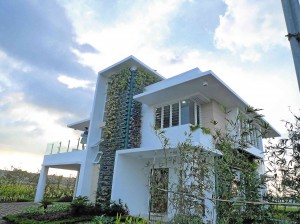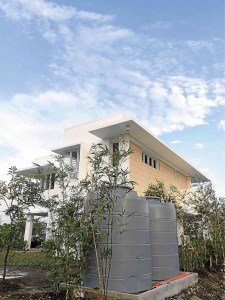CANLUBANG—FIRST it was just an idea, which became a television project. Now it’s a real home. The Green Home project of a TV show that was conceived on the aftermath of the Typhoon “Ondoy” has been realized. The actual two-story house has been completed, is livable and up for sale in the near future.

THE SOLAR-ASSISTED green home with wall garden and double wall. The house also features a solar tube above the walk-in closet of the room to provide natural light into dark areas of the house.
More than just being an ordinary house, its reason for being has been followed to the letter. It has been faithful to the ecological blueprint, which includes the installation of a solar-assisted air conditioner, wall vegetation (featuring a vertical garden shielding walls from direct sunlight), a terra cotta double wall acting as a second skin directly absorbing the sun’s heat, a solar tube that provides as natural light in dark areas of the house and a 200-gallon tank that collects rainwater.
The house’s orientation to optimize natural energies has been spot-on. Its orientation to the sun and wind for maximized natural lighting and passive cooling is evident.
Four months ago, Aguilar invited Inquirer Property to this 475-square-meter lot in the breezy Treveia portion of Nuvali. Back then, during the middle stages of construction, there was just barely a frame of a house spread out over 286 sq m, and it was hard to picture the completed structure if not for the artist’s conception.

THE TERRA Cotta double wall, colored beige, is seen here. Aside from another 200-gallon water tank in one of the rooms, there are two other water storage tanks (shown here, in gray) for excess rainwater to be collected. This, in turn, could be used to wash cars and water the garden.
It was a completely different picture during last Wednesday’s “house blessing.” John Aguilar—president of StreetPark Productions Inc., the team behind Project Green Home and “PhilRealtyTV”—related to Inquirer Property that his group just completed the house in time before the onset of the rainy season.
Environmental characteristics
During the launch, he revealed to media and to partners and sponsors the special environmental characteristics of the house in detail. He explained, for instance, that the beige-colored terra cotta double wall allowed for a cavity for air to exist between the actual wall and the terra cotta wall to better insulate the house. “The walls on the east and west portions of the house aren’t directly heated by the sun,” he pointed out.
Young fruit-bearing trees and bamboo lined the sides of the structure. “We made sure to plant the right trees and bamboo at the right places and in the right quantities to be able to provide shade, but at the same time not totally shield the house from the breeze,” he explained.
PROPONENTS of Project Green Home chose the low-maintenance Forget-Me-Nots and Variegated Picara. Nuvali will be showcasing the house as a model for modern sustainable homes for the next three months.
The plants used for the green wall were Forget-Me-Nots (Plumbago auriculata) and Variegated Picara (Excoecaria cochinchinensis). “We needed plants that would easily thrive and would be low maintenance,” he said. An irrigation system is set to be installed for the green wall.
The louvres, meanwhile, help circulate the air. John said that as hot air rises, they escape out through the open aluminum louvres that had been custom designed for the openings. The rooms have at least two walls with windows with louvres. Instead of forcing shut the entire window when raining, one can open the upper portion of the louvres to let the air circulate. This has been made possible because of the overhangs. The whole house is dominated by large jalousies called Breezeway Louvres, which came from a local distributor that imports the system from Australia but uses local glass.
“Overall, if we could, we got materials that were locally sourced or within a 700-km radius from our project site to minimize the project’s carbon footprint,” John said.
The paint used—the house is predominantly elegant white—was low VOC paint (low volatile organic compound). Salvaged wood was used to make the main door, ledges and some closet cabinets. The stair treads were made from recycled stair planks from an old house. Some furniture were also made of recycled wood and other materials.
Streetpark Productions plans to sell the house to enable the group to work on its next project. Despite all the efforts put into its creation, the house will not be tagged a special price aside from the usual prices Treveia will peg on its houses.
“Eventually we’re hoping that our show in a way has served to educate both the public as well as the developers, suppliers and stakeholders to not take advantage of the green tag they put on their products,” John muses.
John said he has been encouraging suppliers who produce environment-friendly products to price them competitively.
INSULATING mortars were used in other areas of the house, which receives direct sunlight in the mornings and late afternoons. The sun’s path was the main consideration for the orientation of the house. Photos by Tessa R. Salazar
The team’s next project would be called Smart Home. Monica Hipolito, “PhilRealtyTV” brand services consultant, said it would be another ecologically oriented house, but would also be “smart.” That means it wouldn’t just be green, it would also be high-tech, secure and energy-efficient with advanced automated systems.
The launch episode of Project Green Home will be telecast on ANC on May 22 at 7:30 p.m.; May 27, 6 p.m.; and May 28, 11 a.m. It will also be shown on May 31, 8:30 p.m. and June 4, 10 a.m. on the Lifestyle Network.

